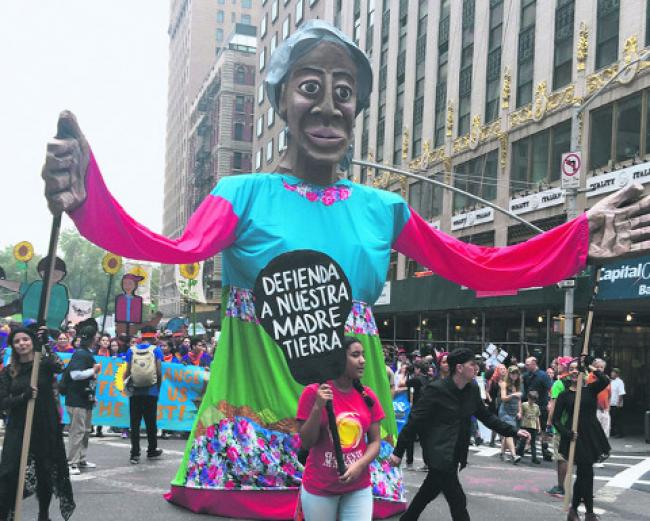Articles Menu

The officials in charge of the United Nations climate talks say that no deal will be done in Paris in December (COP21) to avoid dangerous global warming. After preparatory negotiations in Geneva, Switzerland, this month, Christiana Figueres, executive secretary of the UN Framework Convention on Climate Change (UNFCCC), confirmed that the target set previously, of limiting warming to 2 degrees centigrade above pre-industrial levels, would be missed. Figueres had already said, in December, after a round of talks in Lima, Peru, that “the sum total of efforts [in Paris] will not be able to put us on the path for two degrees. [...] We are not going to get there with the Paris agreement ... We will get there over time.” This month she reiterated that the Paris talks would only “set the pathway for an orderly planned transition over time to a low-carbon society.”
The EU climate commissioner, Miguel Arias Canete, claimed that “you cannot say it is a failure” if, collectively, the world's governments abandoned the 2 degrees target, as long as there is “an ongoing process.”
Voluntary Commitments
Diplomats at Geneva put together an 86-page document for political leaders to haggle over in December. But it's already clear that:
The approach adopted in Kyoto in 1997 – to require countries to cut greenhouse gas emissions by particular amounts, within specified timeframes under international law – has been abandoned. Instead, negotiators are reported to be saying, the new agreement will rely on “peer pressure, national accountability and global cooperation” to “voluntarily” slow down global warming.
The USA, the European Union and China – who jointly account for more than half of all emissions from burning fossil fuels[1] – have already decided on their commitments. A group of academic researchers analysed the likely effect of countries’ promises, and concluded that if governments stick to them, the atmosphere would probably get 3 or 3.5 degrees warmer – rather than the 4-5 degrees of warming likely in a “business as usual” scenario.
Massimo Tavoni of the Politecnico di Milano, who led the research, acknowledged that “there's a lot of uncertainty” with the countries’ targets and their exact effects. What is not uncertain is the relationship between carbon dioxide emissions and warming (see “The Global Carbon Budget,” below).
Neither is there any doubt about the terrible human suffering that researchers associate with warming of 3 degrees or more. (You can get an idea from the latest Intergovernmental Panel on Climate Change (IPCC) Synthesis Report which contains frightful descriptions of the likely consequences of 4 degrees of warming. And don't forget, there are no exaggerations here: it's all been signed off by representatives of all countries that have signed the convention, including Saudi Arabia and other oil producers.)
To summarize:
This is a collective failure of the world's large states.